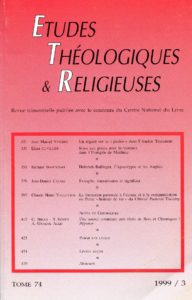Dans le contexte rwandais actuel, il est bien délicat de parler de « justice ». Un détour par une considération sur le sens du mot sèdèq ou sedâqâh (justice dans l’Ancien Testament), en particulier en relation avec l’action de Dieu, ouvre une perspective nouvelle. Cette justice, en effet, sans nier la réalité de la faute, dépasse infiniment le niveau de la rétribution : elle vise à la réintégration du rejeté et au recouvrement de la dignité de la victime et du coupable. Gagnées par ce dynamisme, se demande Jean Marcel Vincent, les Églises rwandaises ne pourront-elles pas contribuer à briser le cercle de la violence ?
Texte légèrement remanié d’un exposé fait le 14 janvier 1998 à la Faculté protestante de Butare (Rwanda).
In the present rwandese context, it is extremely difficult to speak about « justice ». A detour through a consideration of the meaning of the word sèdèq ou sedâqâh (justice) in the Old Testament, in particular in relation to the action of God, opens a new perspective. This justice indeed, without denying the reality of the offence, exceeds infinitely the level of retribution : it aims at a reintegration of the rejected and the recovering of the dignity of both the victim and the guilty. Inspired by this dynamism, could not the rwandese churches contribute to break the circle of violence ?
p. 321-333
Auteur
VINCENT Jean Marcel
Jean Marcel VINCENT (1945-2022) a été professeur d'Ancien Testament de l'Institut protestant de théologie, Faculté de Paris.
